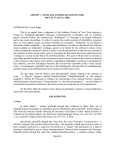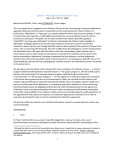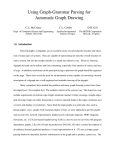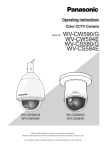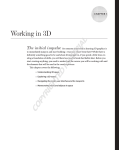Download CS480/580 Introduction to Computer Graphics
Transcript
CS480/580 Introduction to Computer Graphics Sudhanshu Kumar Semwal http://www.cs.uccs.edu/e semwal EN 180, Department of Computer Science Phone: 262-3545. E-mail: [email protected] Office Hours: Tuesday/Thursday: 8:30pm-9:00pm Wednesday: 10 am-12 pm This course is an introduction to the concepts in Computer Graphics. Programming assignments could be completed using the OpenGL Graphics library, JoGL, or Maya. You can implement your projects on a computer of your choice. Note that a working demo is required for all programming assignments in this class. Please make sure that OpenGL sample programs are working on your system at your earliest convenience, so that programming assignment demonstrations can be shown without any problem. In the past, several students have successfully used their own notebooks, PCs, Linux boxes, Macs. If you are planning to use VisualC++ then you might need several (.dll, .obj) files during compilation/linking which may not be installed at systems which you might be using. Several OpenGL examples are available on Internet sites (e.g. www.opengl.org). Please be aware that you will be responsible for installing necessary software on your system and a working demo is required for all programming assignments. PCs in any of the laboratories could also be used for student demonstrations. Please make sure that you have the required libraries so that your programs could be recompiled during the demonstration. Please contact me if interested. There are many sites for sample openGL code and compiling instructions as well. For example, (a) Nate Robins tutorial at www.cs.utah.edu/enarobins; 1 (b) www.opengl.org; (c) http://nehe.gamedev.net (d) www.sgi.com/software/opengl; (e) www.cs.unm.edu/e angel. A simple introductory tutorial on OpenGL can be found at www.cs.uccs.edu/e semwal under OpenGL tutorial. However, no openGL code is provided as many other sites are available, as indicated above. In addition to OpenGL, the Maya Animation package is available for graduate term projects on SGI Machines. A limited version of Maya could also be down-loaded from Alias Wavefront’s web-site onto your systems. JOGL (Java bindings for OpenGL) is another option. Because of travel, my first make-up class is scheduled on Saturday Jan 26th, 2008, between 9-11:30 am. Please make a note of it. Back-up classes are scheduled for Saturday March 8th 2008 and/or April 12th, 2007 at 10:30am-11:45 am in case of weather related emergencies or my absence due to trip or illness. 1 Distribution of grades There are two homework assignment, several programming assignments, and two closed book exams. The distribution of grades (100 percent) is as follows: • Homework (Two assignments) 5 percent each, to be done individually. (Total: 10 percent). • In class, Mid-term (25 percent) and Final examinations (25 percent). (Total: 50 percent). • CS480 Programming assignments (three) (Total: 40 percent). First programming assignment (5 percent); second programming assignment (20 percent); third programming assignment (15 percent). Second and third programming assignments can be combined as a term project of larger extent, please contact semwal if interested. CS580 Programming assignments (Total: 40 percent). First programming assignment (5%); Second programming assignment (15 percent); Term project as Third programming assignment (15 percent); termproject report (5 percent). Second and third programming assignments 2 can be combined as a term project of larger extent, please contact semwal if interested. 2 Week by Week Schedule Please keep yourself up-to-date with the lectures, as sometimes only selected portions of the Chapters would be covered. I will also cover special topics of interest throughout the semester. An outline of the course is as follows: • Week 1-2. Summary and review of Chapters 1-3. Brief OpenGL graphics library introduction (OpenGL). • Week 3. Programming Assignment 1 (duration: two weeks). • Week 4. Chapters 5-6, Homework 1 (duration: one week). (Students to decide larger scope project (February 14th). • Week 5. Graduate term project proposal due (one page by eMail). (February 14th). • Week 6-7. Programming Assignment 2 (duration: two weeks). • Week 8. Chapter 11. • Week 9. Midterm exam: in-class and closed-book (Date March 18th). • Week 10-12. Chapter 14, 15. Programming Assignment 3 (duration: three weeks). • Week 13. Chapter 16, Homework 2 (duration: one week). • Week 14-15. CS580 term project demonstrations (April 28th-May 6th). Special topics, general discussion. • Final exam: in-class and closed-book (Date: May 13th, 2008, 4:30-7:00 p.m.). Springbreak is March 24th-March 30th, 2008. 3 3 Programming Assignments As part of assignment number one, please compile and execute an OpenGL example at your earliest convenience. Programming assignment one would be provided in the second week of class. For CS480 students, following options are available: 1. Three programming assignments using OpenGL. 2. CS480 students can also substitute second and third OpenGL programming assignments with a term project similar to the graduate students. Prior permission is required for this option. Please see me at your earliest convenience, preferably in the first week of the class itself, if interested in this option. Note a final report is required in this option. Graduate (CS580) students are expected to finish the first OpenGL programming assignment similar to the CS480 students. After completing the first assignment a major term project would be undertaken by the CS580 students for the duration of the term. This major term project would be at least equivalent in scope to the combination of the second and the third programming assignments for CS480, and a term report is required at the time of third demo of the term project. Term project Proposals for CS580 students are due by February 14th. However, please consult me well in advance, preferably before February 14th so that we can discuss the topic and the extent of the term project. A mid term demo is also required from CS580 students before the end of March. The final demonstration dates for CS580 term projects are April 28th-May 2nd, 2007. Final demo should consists of a user’s manual (How to use the program), a copy of working program, and a project term-report (description of project, research done, methodology used, bibliography etc.) is required during the final (third) demonstration of the CS580 term project. This is a cross listed course requiring more work to be done by graduate (CS580) students than undergraduate (CS480) students. 4 Programming-Assignment Demonstrations A sign up sheet for the program demonstrations will be posted outside my office door (ENG180). Depending upon the number of students, students 4 could work individually, or form two member groups. However, expectations will be higher for the group projects, and needs to be determined in consultations with me. The grade in these projects would be identical among all the members of the group. The programming assignments would be graded on the basis of the listing of the programs and the demonstrations. I would like all the members of the group to be present during the demonstration. Demo-dates are expected to straddle the due date of the programming assignment. Usually student demonstrations take approximately fifteen minutes and a grade for the demo is normally allotted just after the demonstration. Every program should have reasonable amount of comments e.g. at least one header per procedure etc. A group, can ask for advice on a programming matter from another group but may NOT incorporate (or copy) the other group’s code into their program. Any evidence of submission of another group’s work as your own will result in severe penalties (possibly failing the course). Please note that OpenGL and other related packages (Glut, GLU, GLX, Maya, and JOGL, etc) are only very briefly covered in the class, as details of syntax etc of packages is not the main focus of lectures. Therefore, students are expected to learn features of these packages on their own. Students are encouraged to contact Dr. Semwal with any concerns and questions regarding the course at their earliest convenience. 5 Late submissions Late submission of programming assignments and homeworks would be accepted, but with a penalty of 30 percent of the grade. A programming assignment without a working demonstration can only receive a maximum of thirty percent of the grade for that assignment. After one week of the last demo-date, late submissions will not be accepted. Under extreme circumstances, such as job related absence or illness, an extension would be provided on an individual basis. Please contact me at your earliest in case an extension is needed for assignments, homeworks, or exams. 5 6 Text Books and further reading 1. Computer Graphics: Principles and Practice (in C), Second Edition by Foley van Dam, Feiner and Hughes (text book). 2. OpenGL Programming Guide, Second Edition, Addison Wesley. Useful for programming assignments. 3. OpenGL Primer by Edward Angel, Pearson education. Recommended text book for understanding the basics of OpenGL. 4. Several books on Maya: Learning Maya from Alias Wavefront. 5. Maya by Riddle and Brit, PeachPit Press. 6. Computer Graphics by Hearn and Baker. 7. Principles of Interactive Computer Graphics by Newman and Sproull. 8. Geometric Modeling by Mortenson. 9. Ray tracing by A. S. Glassner. 10. Curve and Surfaces for CAD by Farin. 7 About the CS580 Term Project CS580 student’s term projects can come from a variety of areas, such as: 3D Games, animation, modeling natural phenomena, shading of 3D objects, realistic images (ray tracing and radiosity), force-feedback devices, advanced animation and virtual reality, medical application of graphics, morphing, Maya based animations, and game development. All these projects may require reading ahead and research into Journals and magazines: e.g. IEEE Computer Graphics and Application, Computer Graphics and Image Processing, ACM transaction on Graphics. Once again, please remember that each project group should submit a one-page project proposal by Feb 14th, but before you do that please talk to me for project approval. 6 8 Department Policy on Late Drop A late drop will be approved only if there is documented evidence that the student was prevented from attending a significant number of classes by circumstances beyond his or her control. Thank you. HAVE FUN. 7










